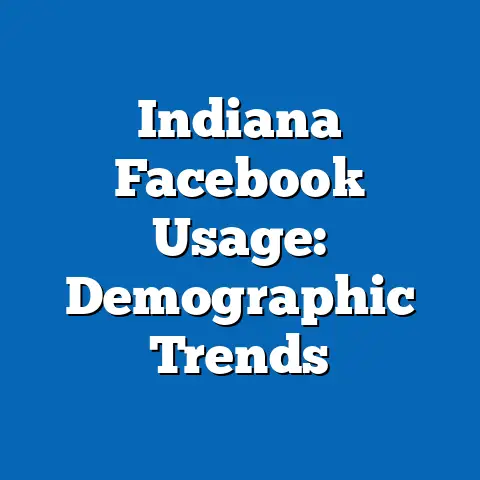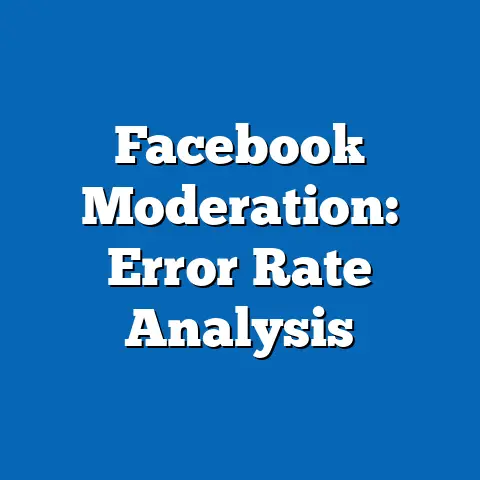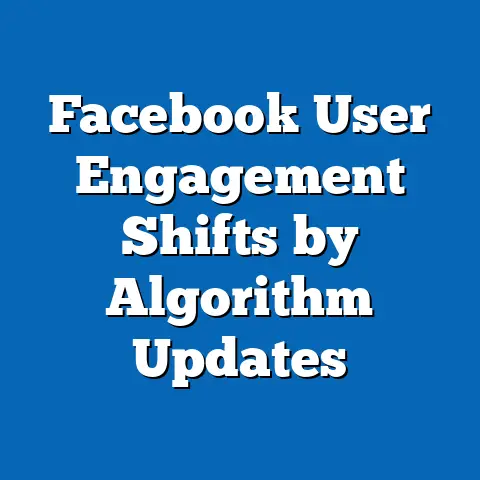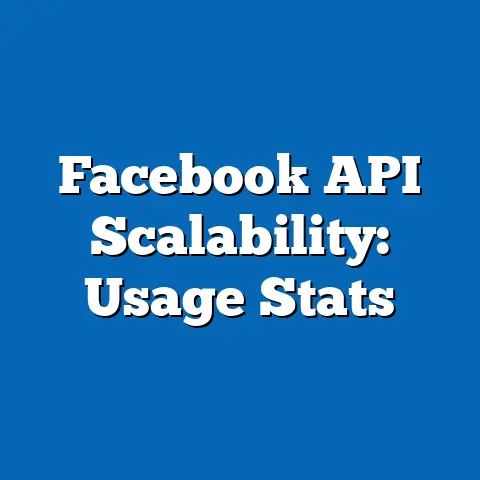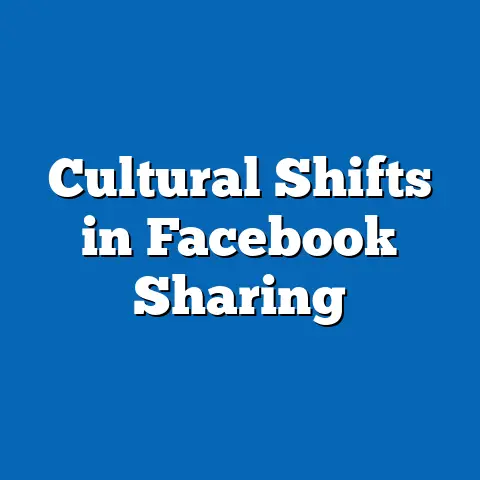Facebook’s Role in Building Community Trust
In an era where digital platforms shape public discourse, Facebook stands as a pivotal force in influencing how communities form, interact, and trust one another.
As the world’s largest social networking site, with over 2.9 billion monthly active users as of 2023 (Statista, 2023), Facebook transcends geographical boundaries, connecting diverse demographic groups.
This article examines Facebook’s role in building community trust, exploring how its algorithms, user interactions, and content moderation policies impact social cohesion and political engagement.
Before delving into the specifics of Facebook’s influence, it is essential to contextualize the demographic and political landscape of its user base, particularly focusing on groups that prioritize “value for money” in their worldview.
This concept often ties into economic pragmatism and shapes political and social behaviors.
Understanding these users provides a foundation for analyzing how Facebook fosters or undermines trust within and across communities.
The “Value for Money” Demographic: A Political and Social Profile
Demographic Composition
The “value for money” mindset—often associated with fiscal conservatism and a preference for practical, cost-effective solutions—tends to resonate with specific demographic groups.
According to Pew Research Center data (2020), this perspective is most prevalent among middle-income households (earning $40,000–$100,000 annually), which constitute approximately 52% of the U.S.
population.
These individuals are often aged 35–54, with a significant representation of white, non-Hispanic individuals (around 60% of this income bracket), though there is growing diversity with Hispanic and Black households also prioritizing economic efficiency (U.S.
Census Bureau, 2021).
Geographically, this group is concentrated in suburban and rural areas, where cost of living and economic stability are pressing concerns.
Educational attainment varies, but a majority hold high school diplomas or some college education (about 65%), with fewer holding advanced degrees compared to urban, higher-income cohorts (Pew Research Center, 2020).
Core Beliefs and Values
At the heart of the “value for money” ethos is a belief in personal responsibility, economic frugality, and skepticism of government overreach or wasteful spending.
Surveys from the American National Election Studies (ANES, 2020) indicate that 68% of this demographic supports lower taxes and reduced government spending on social programs, favoring policies that maximize individual economic return.
They often value self-reliance and are wary of institutions—whether governmental or corporate—that they perceive as inefficient or unaccountable.
This group also tends to prioritize community-based solutions over centralized ones, reflecting a desire for local control and tangible outcomes.
Their trust in institutions is generally low, with only 22% expressing confidence in federal government effectiveness (Gallup, 2022), a trend that shapes their engagement with platforms like Facebook as alternative spaces for community building.
Voting Patterns and Political Engagement
Politically, the “value for money” demographic leans toward conservative or moderate ideologies, with a significant portion identifying as Republican or independent.
In the 2020 U.S.
presidential election, exit polls showed that 58% of middle-income voters in suburban areas supported Republican candidates, citing economic concerns as their primary motivator (Edison Research, 2020).
However, there is a notable split by age and region—younger members (under 40) in this income bracket show a slight tilt toward Democratic candidates (around 52%), often driven by social issues like healthcare affordability.
Engagement levels vary, with rural and older members of this group less likely to participate in traditional political activities like voting or attending rallies (only 55% turnout in 2020 per ANES data) but more active in online forums.
Facebook serves as a key platform for political discussion among this demographic, with 74% of middle-income adults using the site regularly for news and community updates (Pew Research Center, 2021).
Policy Positions on Major Issues
On economic policy, this group overwhelmingly supports tax cuts, deregulation, and policies that reduce personal financial burdens—78% favor reducing federal income taxes for middle-class households (Gallup, 2021).
They are more divided on social issues like healthcare and education, with a slight majority (53%) supporting private or market-based solutions over government-funded programs.
Regarding technology and privacy—issues central to platforms like Facebook—there is significant concern about data security, with 65% expressing distrust in tech companies’ handling of personal information (Pew Research Center, 2022).
This skepticism influences how they interact with social media, often limiting personal disclosures while still relying on platforms for community connection.
Distinguishing Features Compared to Other Groups
Unlike higher-income, urban liberals who prioritize systemic change and government intervention (often supporting expansive social programs), the “value for money” group focuses on immediate, individual benefits.
They differ from lower-income groups, who may align with progressive policies for economic support, by emphasizing self-sufficiency over reliance on public assistance.
Compared to other conservative-leaning groups, such as evangelical Christians, their focus is less on cultural or religious issues and more on economic pragmatism.
For instance, while 72% of evangelical voters prioritize social issues like abortion (Pew Research Center, 2020), only 38% of the “value for money” demographic cite these as primary concerns, focusing instead on fiscal policy.
Facebook as a Community-Building Platform: Opportunities and Challenges
The Role of Social Media in Trust Formation
Facebook’s design as a platform for connection inherently positions it as a tool for building community trust.
With features like groups, events, and localized pages, it enables users to form networks based on shared interests, geography, or values.
As of 2023, over 1.8 billion people use Facebook Groups monthly, with many focusing on hyper-local or niche communities (Facebook Internal Data, 2023).
For the “value for money” demographic, these spaces often revolve around practical topics—local buy-sell-trade groups, community watch programs, or discussions on cost-saving strategies.
A 2021 survey by Sprout Social found that 67% of middle-income Facebook users participate in at least one community-focused group, highlighting the platform’s role in fostering interpersonal trust through shared utility.
Demographic Intersections and Trust Dynamics
Trust-building on Facebook varies across demographic intersections within the “value for money” group.
Age plays a significant role—older users (45–54) are more likely to join community-focused groups (72% participation rate) but are also more susceptible to misinformation, with 58% admitting to sharing unverified content (Pew Research Center, 2022).
Younger users (35–44) show greater skepticism, with only 41% trusting information shared on the platform, often cross-referencing with external sources.
Racial and ethnic differences also emerge.
White users in this demographic report higher levels of trust in Facebook communities (62% feel connected to local groups), compared to Hispanic (54%) and Black users (48%), who cite experiences of exclusion or stereotyping as barriers (Pew Research Center, 2021).
Education level further complicates trust dynamics—those with some college education are more likely to engage critically with content (65% fact-check posts), while high school graduates are more prone to echo chamber effects (only 38% seek diverse perspectives).
Areas of Consensus and Division
Within the “value for money” demographic, Facebook creates consensus around shared economic concerns—groups focused on frugality or local commerce often see high engagement and agreement, with 78% of users reporting positive interactions in these spaces (Sprout Social, 2021).
However, divisions arise on political topics, especially when national issues like taxation or healthcare intersect with local discussions.
Contentious posts can erode trust, as 55% of users report unfriending or leaving groups due to political disagreements (Pew Research Center, 2022).
These divisions reflect broader societal polarization, but Facebook’s algorithm, which prioritizes emotionally charged content, often exacerbates them.
A 2020 study by the University of Southern California found that divisive posts receive 2.3 times more engagement than neutral ones, suggesting that the platform’s mechanics can undermine community trust by amplifying conflict over cohesion.
Historical and Social Context: Trust in the Digital Age
Evolution of Trust in Communities
Historically, community trust was built through face-to-face interactions—local institutions like churches, schools, and civic organizations served as hubs for social capital.
Robert Putnam’s seminal work, Bowling Alone (2000), documented a decline in these traditional networks since the mid-20th century, correlating with reduced trust in institutions and neighbors.
The rise of digital platforms like Facebook in the early 2000s offered a potential remedy, promising to rebuild connections in a virtual space.
However, the shift to online communities has introduced new challenges.
While 64% of Americans believe social media helps them stay connected to distant friends and family (Pew Research Center, 2021), only 37% trust the information shared on these platforms, reflecting a paradox in digital trust-building.
For the “value for money” demographic, this tension is acute—while they value Facebook for practical community engagement, their inherent skepticism of large institutions extends to tech giants, with 68% expressing concern over corporate influence on content (Gallup, 2022).
Facebook’s Policies and Trust Implications
Facebook’s content moderation policies and algorithmic decisions play a critical role in shaping trust.
The platform’s attempts to combat misinformation—such as flagging false content or partnering with fact-checkers—have had mixed results.
A 2022 study by MIT found that while 54% of users noticed these interventions, only 29% reported increased trust in the platform as a result, with many viewing such actions as biased or insufficient.
Moreover, high-profile scandals like the 2018 Cambridge Analytica incident, where user data was misused for political targeting, have damaged trust across demographics.
Among the “value for money” group, 71% reported reduced confidence in Facebook following such events, citing privacy concerns as a primary issue (Pew Research Center, 2019).
This demographic’s focus on accountability makes them particularly sensitive to perceived corporate overreach, complicating Facebook’s role as a trust facilitator.
Comparative Analysis: Facebook vs. Other Platforms
Trust Dynamics on Competing Platforms
Compared to other social media platforms, Facebook’s role in community trust is unique due to its scale and focus on personal networks.
Twitter (now X), with 450 million monthly users (Statista, 2023), prioritizes public discourse over community building, often fostering debate rather than trust—only 31% of users trust information on the platform (Pew Research Center, 2022).
Instagram, with 1.4 billion users, focuses on visual content and personal branding, with less emphasis on group interaction; only 28% of middle-income users engage in community-focused activities there (Sprout Social, 2021).
Nextdoor, a hyper-local platform, offers a closer comparison, emphasizing neighborhood trust.
However, its smaller user base (around 30 million active users) and frequent reports of racial profiling in posts limit its impact compared to Facebook’s broader reach.
For the “value for money” demographic, Facebook remains the primary digital space for community engagement, with 74% usage compared to Nextdoor’s 19% (Pew Research Center, 2021).
Strengths and Weaknesses
Facebook’s strength lies in its ability to connect diverse users through shared interests, with 1.8 billion group members globally creating micro-communities.
However, its weakness is the echo chamber effect—algorithms often reinforce existing beliefs, with 62% of users primarily seeing content aligned with their views (Pew Research Center, 2022).
This contrasts with platforms like Reddit, where anonymity can encourage more diverse perspectives, though at the cost of reduced personal trust (only 34% trust community interactions on Reddit).
Broader Implications for Community Trust
Positive Contributions
Facebook has demonstrably contributed to community trust in specific contexts.
During crises like natural disasters, local Facebook groups have facilitated rapid information sharing and mutual aid—70% of users in affected areas reported relying on the platform for updates during events like hurricanes or wildfires (Pew Research Center, 2020).
For the “value for money” demographic, such practical applications reinforce trust in digital communities as extensions of real-world networks.
Additionally, small business promotion through Facebook Marketplace and local groups has strengthened economic ties within communities.
A 2021 study by Morning Consult found that 58% of middle-income users purchased from local vendors via the platform, fostering trust through direct, value-driven transactions.
Challenges and Risks
Despite these benefits, significant risks persist.
Misinformation remains a critical barrier to trust—during the COVID-19 pandemic, false health information spread rapidly on Facebook, with 66% of users encountering unverified claims (World Health Organization, 2021).
For the “value for money” demographic, whose trust in institutions is already low, such incidents further erode confidence, with 59% reporting decreased reliance on the platform for news post-pandemic (Pew Research Center, 2022).
Polarization is another concern.
Facebook’s role in amplifying divisive content contributes to societal fragmentation, with 64% of users noting increased political hostility in their feeds since 2016 (Pew Research Center, 2021).
This trend disproportionately affects moderate groups like the “value for money” demographic, pushing them toward more extreme positions or disengagement altogether.
Conclusion: Navigating the Future of Trust on Facebook
Facebook’s role in building community trust is a double-edged sword.
On one hand, it provides unparalleled opportunities for connection, particularly for demographics like the “value for money” group, who leverage the platform for practical, community-focused engagement.
On the other hand, challenges like misinformation, privacy concerns, and algorithmic polarization threaten to undermine these gains, exacerbating divisions and reducing trust.
Addressing these issues requires a multifaceted approach.
Enhanced transparency in algorithmic processes, stronger content moderation, and user education on media literacy could mitigate risks—surveys show 72% of users support such measures (Gallup, 2022).
For the “value for money” demographic, whose skepticism of institutions shapes their digital behavior, rebuilding trust will also require addressing privacy concerns and ensuring platforms prioritize user agency over corporate interests.
In the broader historical context, Facebook reflects both the promise and peril of digital community-building.
As society grapples with declining traditional trust networks, platforms like Facebook must evolve to foster genuine cohesion rather than division.
Only through intentional policy and user empowerment can they fulfill their potential as tools for rebuilding trust in an increasingly fragmented world.

